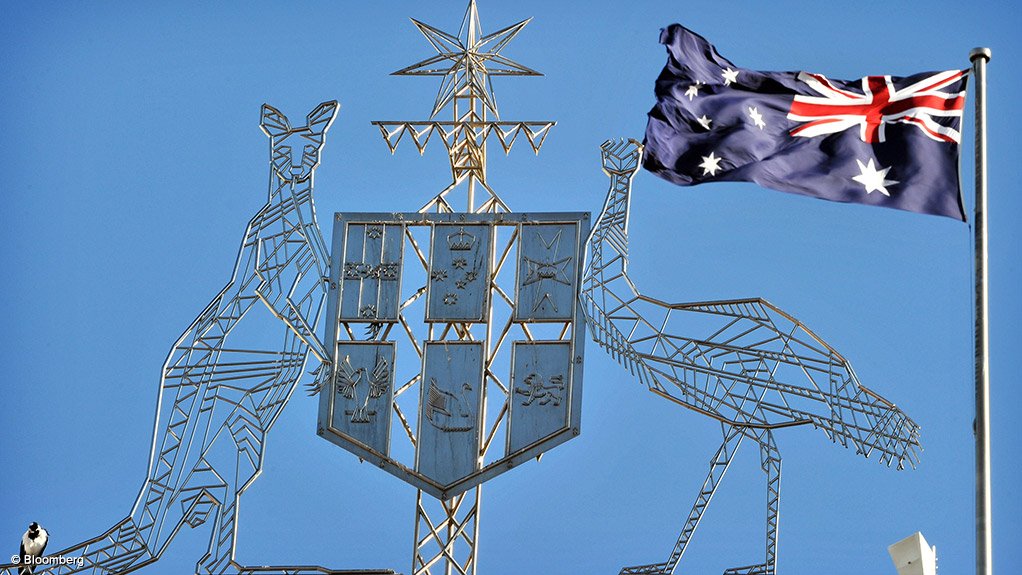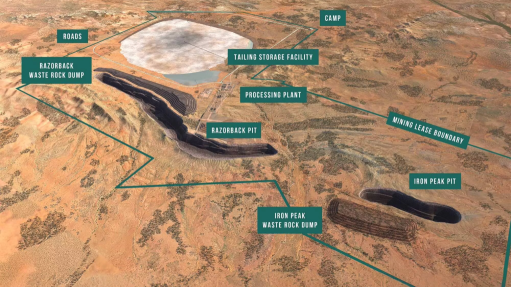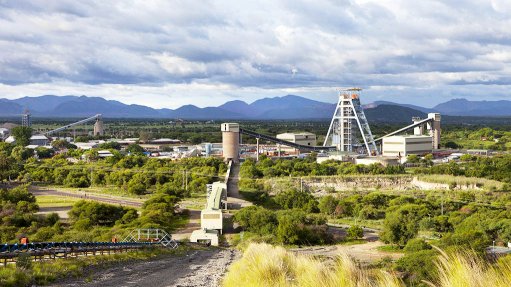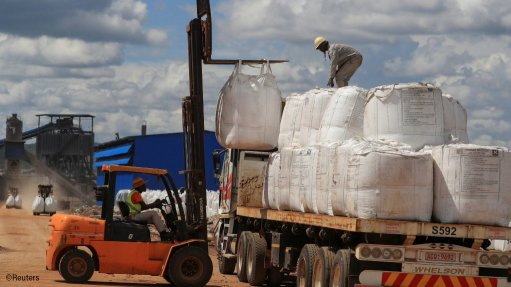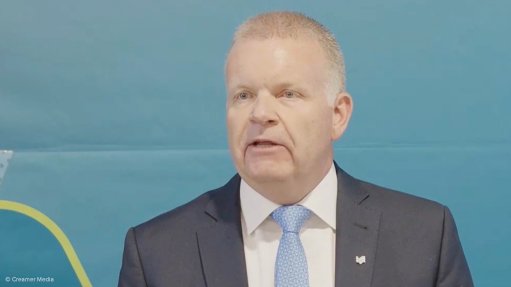Resources drives Budget to surplus
PERTH (miningweekly.com) – The federal Budget had delivered a A$4.2-billion surplus, a significant turnaround from the A$32-billion deficit unveiled last year, with the government announcing a range of investments to fund the resources sector.
“The government’s second Budget lays the foundations for a stronger future by taking further steps to help Australia capitalise on the transformation to cleaner, cheaper energy and promote energy security,” said Resources Minister Madeleine King.
“The road to net zero runs through the resources sector. After a decade of delay and inaction under the Liberals and Nationals, the Albanese government is providing the leadership, investment and policy certainty the sector needs to thrive.
“We’re developing the critical minerals industry needed to make batteries and other green technologies - an integral part of our plan for Australia to become a renewable energy superpower,” King said.
“Our vision is for an Australian resources sector that continues to grow national prosperity, supports jobs and opportunities and drives the global transformation to net zero. We want to ensure the resources sector continues to lead on climate response, First Nations engagement and environmental protection.”
She noted that critical minerals, including rare earths, were crucial components of low-emissions technologies such as batteries, electric vehicles and solar panels, and would be increasingly important to global efforts to decarbonise and reach Paris commitments.
As such, Budget funding included A$57.1-million for the established of the Critical Minerals International Partnerships Program. This is aimed at stepping up international engagement, attracting investment from like-minded partners and accelerating projects of strategic interest.
A further A$21.2-million will go to ensure the ongoing operations of the Critical Minerals Office, which is driving policies, programmes and international engagement, while A$2.2-million will be spent by Treasury to establish data analysis capabilities, to track foreign investment patterns and compliance in the critical minerals sector.
For the oil and gas sector, the Budget has announced a A$12-million investment for a review of the environmental management regime for offshore petroleum and greenhouse gas storage activities, with a particular focus on consultation, including with First Nations Australians.
“Australia has a robust regulatory framework for offshore oil, gas, and carbon capture and storage activities. As this sector transforms, it is imperative that our regulations are fit-for-purpose for a decarbonising economy,” King said.
She noted that gas would be an important part of Australia’s energy mix, adding that the flexibility of gas as a firming fuel and a key manufacturing input would be required as the transition accelerated domestically, and in the region.
“Adequate gas supply also assists Australia and its international partners to process critical minerals and manufacture the wind turbines, batteries and other clean energy technologies that will play a critical role in reaching net zero emissions.
Recognising this, the Australian government will provide A$6.7-million to develop a Future Gas Strategy to support Australia’s energy system to reach 82% renewables by 2030 and become cleaner, cheaper and more reliable while maintaining its international reputation as a trusted energy supplier to the region.
A further A$14.3-million will go to partner with the Queensland government, supporting research and development into reducing emissions in Australia’s energy resources sector.
Furthermore, the government is working to ensure that offshore oil and gas infrastructure is decommissioned in an environmentally responsible and safe way.
“Australia expects an estimated A$60-billion of offshore petroleum decommissioning activity to occur over the next 30 to 50 years,” King said.
In response, the Budget will invest up to A$4.5-million to develop a Roadmap for Establishing a Decommissioning Industry in Australia. The roadmap will identify ways Australia can benefit from the A$60-billion projected expenditure, any repurposing, recycling and waste disposal pathways for decommissioned infrastructure, and opportunities to re-skill oil and gas workers for an emerging decommissioning industry.
The Budget also includes funding in 2023/24 for ongoing work to decommission the Northern Endeavour Floating Production Storage and Offtake platform. The funding will be recouped over time by the existing Laminaria and Corallina Decommissioning Levy.
Australian Petroleum Production & Exploration Association (Appea) said that the federal Budget paved the way for much-needed new gas supply, recognised low-carbon hydrogen and carbon capture, utilisation and storage (CCUS) as crucial to net zero and confirmed the growing economic contribution of the oil and gas industry to the nation’s finances.
Appea CEO Samantha McCulloch said the new Future Gas Strategy showed the government had listened to industry concerns and recognised the urgent need for a strategy to secure new gas supply to avoid shortfalls in coming years.
“New gas supply is essential to keep the lights on, put downward pressure on prices and deliver substantial economic benefits in the transformation of our energy system for net zero,” McCulloch said.
“The national strategy announced is a response to independent reports and authorities warning of gas supply shortfalls and allows for a coordinated policy response. Appea has been calling for a new supply strategy and looks forward to working constructively with the government as part of this process.”
However, McCulloch said that the Budget fell short of committing to a national CCUS roadmap in partnership with industry to provide the clear policy direction needed to promote Australia as a regional carbon storage leader.
“We share Australia’s commitment to reducing emissions to achieve net zero across the economy by 2050 and CCUS will be a key tool.
“Global momentum for CCUS is growing and Australia must not miss the emissions reduction and economic opportunity of an emerging CCUS industry that creates new jobs and investment,” she added.
Meanwhile, mining industry bodies have pointed out that the Budget surplus was driven by the strength of Australia’s resources sector, with the Minerals Council of Australia stating that the surplus did not have to be a one-off event, and that the predicted fall in mining investment in the coming years could be reversed.
“More than ever, Australia needs an internationally competitive and productive minerals industry given the economic headwinds and the urgent need to create a net zero emissions future,” said MCA CEO Tania Constable.
“As the Australian economy continues to face hurdles, and pressure remains on government spending, the federal government must do everything in its power to foster economic growth by nurturing investment.
“The federal government must recognise the effect its targeted policies against businesses is having on confidence and investment. Policy settings to support business growth and investment are largely absent from the Budget. Failing to prioritise productivity measures that drive investment, wages and profitability is a missed opportunity,” Constable said.
“Minerals have helped propel our economy forward, boosted economic opportunity and security, and enabled the federal government to invest in the things that really matter: families, communities and vital services like hospitals, schools, childcare, aged care and infrastructure.
“The record tax paid by Australian mineral companies in 2021/22, amounting to some A$41-billion, is the result of the massive investment by the minerals industry that occurred a decade ago. It underpins the federal government’s rapidly improved budget position this year.
“Going forward, Australia’s vulnerability to competition from resource-rich economies will only grow as they seek to seize the opportunity to supply the minerals and metals needed to achieve global net zero emissions,” she added.
Constable’s comments were echoed by the Association of Mining and Exploration Companies (Amec), which said that the first surplus in 15 years had been delivered on the back of high commodity prices and the work of the resources industry.
“This support has enabled the government to deliver $14.5-billion in cost-of-living measures for Australians to offset the impact of significant inflation occurring in the Australian economy,” said Amec CEO Warren Pearce.
“Equally, Australian industry is also facing increasing challenges in the form of persistent inflation, supply chain pressure, an inability to source workers, along with increasing international competition.”
Pearce warned that without substantially stronger support from Australian governments and Australia’s international partners, the ability of Australian projects to attract capital for value-adding would diminish, and with it the opportunity to realise greater value from the country’s resources, and the highly skilled and highly paid jobs that would accompany it.
“Critical to addressing workforce issues, is the government’s Migration Strategy which outlines a range of significant measures, with 70% of 190 000 migration places in 2023/24 to be made up of skilled migrants, combined with a major investment in training and a further 300 000 TAFE and vocational education training places to become fee-free,” Pearce said.
“Each is needed to support industry’s skilled worker needs, however, despite the ambitions of the National Housing Accord and the Housing Australia Future Fund, delivering the housing growth to accommodate the needs of new migrants looks especially challenging.”
Pearce also said that continued infrastructure investment in Australia’s regions was key to stimulating economic development in these areas, and critical to improving the commercial viability of mining and mineral exploration projects in these areas.
“Industry will be watching the outcome of the infrastructure review closely,” he added, making note of an expected 90-day review into the A$120-billion, ten-year infrastructure pipeline of over 700 projects.
Meanwhile, the Chamber of Minerals and Energy for Western Australia (CME) has welcomed the government’s investment in Australia’s energy transformation and its commitment to establish Australia as a renewable energy superpower, with strong strategic industries in global supply chains.
“CME and its member companies are incredibly proud of the role that WA’s mining and resources sector plays in making a positive difference to people’s lives across the nation," said CEO Rebecca Tommkinson.
“There are a range of initiatives, announced both in the lead-up to the Budget and tonight, which are a clear recognition of the critical role our commodities will play in a low carbon future.
“These include the A$2-billion Hydrogen Headstart program, which aims to position Australia as a world leader in producing and exporting hydrogen power, as well as funding for the operations of the Critical Minerals Office and the development of a Future Gas Strategy.
“Measures announced in the Budget will help build the sector’s workforce of the future and foster the use of new technologies to deliver lower emissions energy.”
However, Tomkinson said governments would need to be prepared to do more to maximise these opportunities to ensure Australia realised its ambitions of becoming a renewable energy superpower.
“While the acknowledgement of the critical role commodities will play in this is welcome, there are few Budget measures which will materially address the increasingly intense competition for global capital, stagnant productivity growth, and the increased costs and uncertainty flowing from the cumulative impact of regulatory changes and persistent regulatory and administrative inefficiencies,” she said.
Article Enquiry
Email Article
Save Article
Feedback
To advertise email advertising@creamermedia.co.za or click here
Press Office
Announcements
What's On
Subscribe to improve your user experience...
Option 1 (equivalent of R125 a month):
Receive a weekly copy of Creamer Media's Engineering News & Mining Weekly magazine
(print copy for those in South Africa and e-magazine for those outside of South Africa)
Receive daily email newsletters
Access to full search results
Access archive of magazine back copies
Access to Projects in Progress
Access to ONE Research Report of your choice in PDF format
Option 2 (equivalent of R375 a month):
All benefits from Option 1
PLUS
Access to Creamer Media's Research Channel Africa for ALL Research Reports, in PDF format, on various industrial and mining sectors
including Electricity; Water; Energy Transition; Hydrogen; Roads, Rail and Ports; Coal; Gold; Platinum; Battery Metals; etc.
Already a subscriber?
Forgotten your password?
Receive weekly copy of Creamer Media's Engineering News & Mining Weekly magazine (print copy for those in South Africa and e-magazine for those outside of South Africa)
➕
Recieve daily email newsletters
➕
Access to full search results
➕
Access archive of magazine back copies
➕
Access to Projects in Progress
➕
Access to ONE Research Report of your choice in PDF format
RESEARCH CHANNEL AFRICA
R4500 (equivalent of R375 a month)
SUBSCRIBEAll benefits from Option 1
➕
Access to Creamer Media's Research Channel Africa for ALL Research Reports on various industrial and mining sectors, in PDF format, including on:
Electricity
➕
Water
➕
Energy Transition
➕
Hydrogen
➕
Roads, Rail and Ports
➕
Coal
➕
Gold
➕
Platinum
➕
Battery Metals
➕
etc.
Receive all benefits from Option 1 or Option 2 delivered to numerous people at your company
➕
Multiple User names and Passwords for simultaneous log-ins
➕
Intranet integration access to all in your organisation



